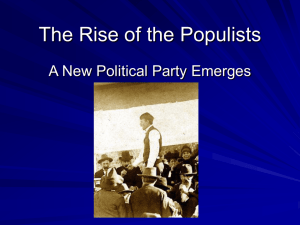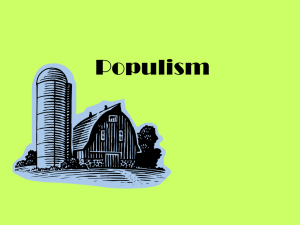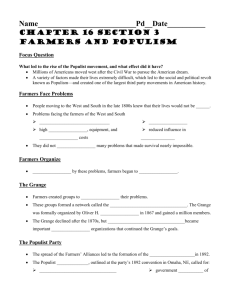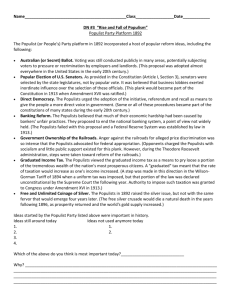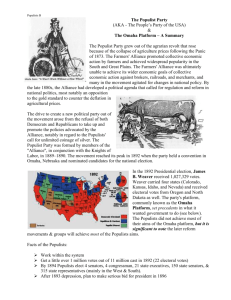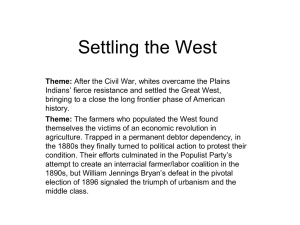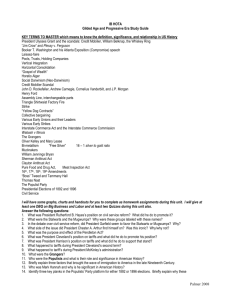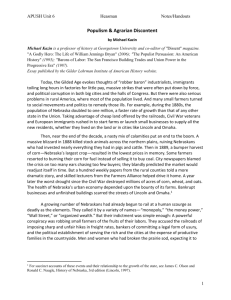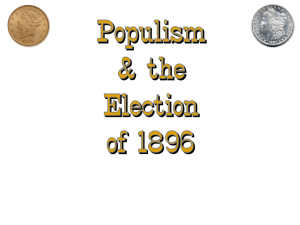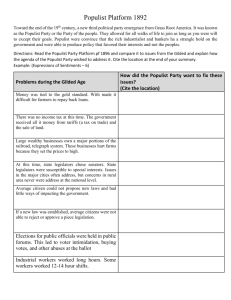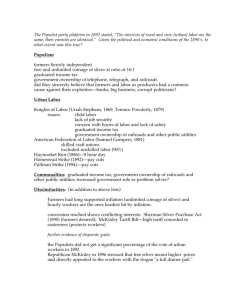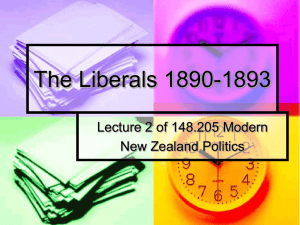Populism--PDF
advertisement
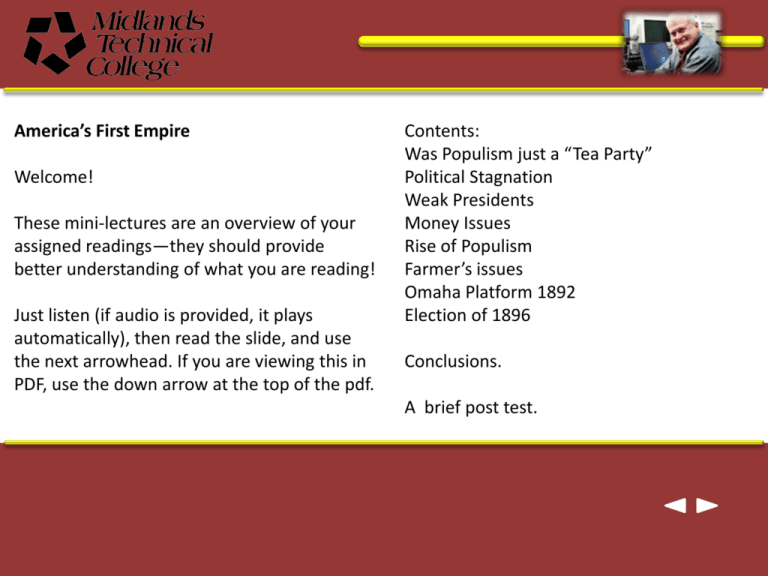
America’s First Empire Contents: Was Populism just a “Tea Party” Welcome! Political Stagnation Weak Presidents These mini-lectures are an overview of your Money Issues assigned readings—they should provide Rise of Populism better understanding of what you are reading!896 Farmer’s issues Omaha Platform 1892 Just listen (if audio is provided, it plays Election of 1896 automatically), then read the slide, and use the next arrowhead. If you are viewing this in Conclusions. PDF, use the down arrow at the top of the pdf. A brief post test. The conditions which surround us best justify our co-operation; we meet in the midst of a nation brought to the verge of moral, political, and material ruin. Corruption dominates the ballot-box, the Legislatures, the Congress, and touches even the ermine of the bench. The people are demoralized; most of the States have been compelled to isolate the voters at the polling places to prevent Universal intimidation and bribery. The newspapers are largely subsidized or muzzled, public opinion silenced, business prostrated, homes covered with mortgages, labor impoverished, and the land concentrating in the hands of capitalists. The urban workmen are denied the right to organize for self-protection, imported pauperized labor beats down their wages, a hireling standing army, unrecognized by our laws, is established to shoot them down, and they are rapidly degenerating into European conditions. The fruits of the toil of millions are boldly stolen to build up colossal fortunes for a few, unprecedented in the history of mankind; and the possessors of those, in turn, despise the republic and endanger liberty. From the same prolific womb of governmental injustice we breed the two great classes—tramps and millionaires. The politics of stagnation And a populist uprising politics of stagnation populist uprising Hayes Hayes(R), 1876--one term Garfield(R), 1880 Arthur, 1881 Cleveland(D), 1884 & 1892 Harrison(R), 1888 Pendleton Civil Service Reform Arthur As Cleveland entered the Whitehouse the biggest issue was MONEY. Democrats wanted more inflation, or money in circulation. Republicans wanted limited paper money. Silver prices fall (impacting the west) ratio 16:1 (silver to gold) two acts to subsidize silver: 1878--Bland-Allison Act 1890--Sherman Purchase Act crisis by 1890s….. Discontent in Midwest & West Populism was an agricultural malaise... Started in the West Picked up steam in the South Made appeals to “have-nots” What went wrong on the farm? Poor Transportation in West Western farms isolated Rails promised help, but were slow and built only main lines Roads and machinery scarce Constant threats of Indian battles limited road building Farm Prices By 1878 wheat and corn prices both begin to decline—kept falling until 1901 somewhat due to over production also due to better transportation to major markets Most farm prices fell until 1901 Costs of production rose Poor sources of banking & credit Higher Tariffs, a real issue for farmers Federal laws taxed imported manufactured goods This kept prices of domestic items--like plows, barrels, and other goods farmers needed high Industry & government were blamed Farmers organize Trace emphasis and impact of The National Grange The Greenback Party The Alliance Asked labor and miners to join them People’s Party...or Populists Nat’l Grange Social group, formed by Oliver Kelley 800,000 members in 14 states Very successful large coops with purchasing power lowered costs Won approval of Illinois law regulating Rail rates (Munn case) Farmer’s Alliance & Greenbackers Proposed a little of everything Northern Alliance under Milton George proposed income taxes, rail regulation, and more greenbacks as a stimulant . Alexander Campbell, founder Greenbacks These third party Groups were severely criticized by the main stream politicians. Here the Greenbackers are ridiculed as favoring Socialists, Communists, and Women! Omaha Platform & 1892 Elections 1. We demand free and unlimited coinage of silver and gold at the present legal ratio of l6 to 1. 2. We demand that the amount of circulating medium be speedily increased to not less than $50 per capita. 3. We demand a graduated income tax. 4. We believe that the money of the country should be kept as much as possible in the hands of the people, and hence we demand that all State and national revenues shall be limited to the necessary expenses of the government, economically and honestly administered. 5. We demand that postal savings banks be established by the government for the safe deposit of the earnings of the people and to facilitate exchange. Ignatius Donnelly, a Congressman from Minnesota, wrote preamble to Omaha Platform, 1892. Read the Omaha Platform, 1892 http://historymatters.gmu.edu/d/5361 1890-1892 Two Alliance Senators elected— Kyle (SD) and Peffer (KS) People’s Party (Populists) formed One of 11 voters in Presidential campaign of 1892 went People’s Party Populist Thomas E Watson People’s Party critics 1892 People’s Party Supporters 1892 Populists Platform by 1896Silver coinage & more greenbacks 8 hour day and pensions for railroad workers Federal ownership of rails Limits on immigration Subsidize overproduced goods Public leadership grows, sound familiar? James B. Weaver Mary E. C. Lease Thomas E. Watson Ignatius Donnelly Watson Sophia Harden 1896 Depression era, democrats blamed Republicans: nominate McKinley (gold) Democrats and Populists nominate: Bryan (silver) America’s first “fusion” ticket Safe, organized Republicans win over radicals and silverites 36 YR. OLD WM. J. BRYAN WINS DEM. & POPULIST NOMINATIONS MISSIONARY ZEAL.. 18,000 MILES & 600 SPEECHES McKinley's campaign manager, Marcus Hanna, conducts the perfect national campaign. Thousands of different fliers in over 200 languages blanket the Northeast, Midwest, and urban centers. The safe Gold Standard wins. McKinley’s Front Porch Campaign Hanna Conclusions! Politics as normal?? Bryan’s “Cross of Gold” speech—said “you shall not press down on labor a Cross of gold”…. Did the People’s Party really fail? They did get national attention. And between 1900 and World War I Americans would embrace reform at the local and state levels—and gradually at the national level. A Brief Post Test! Read the question, then click on the best answer to see feedback. American Presidents from 1877 to 1900 were weak. True. False. President Arthur’s Civil Service Reform was a significant accomplishment. True. False. President Cleveland only served one term. True. False. Farm discontent rose as agricultural prices fell in the late 1890s.. True. False. Farmers felt higher tariffs helped big business but hurt farmers. True. False. The National Grange was mostly a social and cooperative organization . True. False. The Greenback party demanded deflation. True. False. The Omaha Platform of 1892 demanded coinage at 16 to 1 ratio. True. False. The populist or people’s party failed to elect any candidates. True. False. Wm. J. Bryan was the first candidate officially nominated by two major parties. True. False. Good! That is Correct! Click to return to the Post Test! Yikes! Try that again! Click to return to the Post Test!
